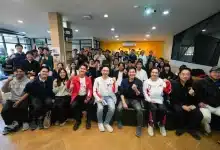Thailand govt to auction decade-old stash after safety check

Thailand’s government will move forward with plans to auction off rice from Yingluck Shinawatra’s pledging scheme, stored in two Surin warehouses for a decade, following a laboratory test confirming its safety for consumption.
Deputy Prime Minister and Commerce Minister Phumtham Wechayachai, currently in Italy, announced that a private laboratory’s tests on samples from the Surin warehouses revealed no aflatoxins or other chemical residues. The samples were provided by a reporter from a private media outlet.
Phumtham said he was happy about the result, especially since the samples were sent in by journalists, noting that the samples were also sent to the Department of Medical Sciences (DMSc) for further examination. With the rice deemed safe, Phumtham directed the Public Warehouse Organisation to prepare the terms of reference and draft the contracts for the auction.
DMSc Director-General, Dr Yongyot Thammavudhi, stated yesterday, May 19, that the department completed its testing of the rice samples from the Commerce Ministry. The results will be disclosed at a press conference today.
Prime Minister Srettha Thavisin has expressed that the government seeks a neutral agency to assess the rice’s quality to determine its suitability for export.
“If the buyers want us to check the rice’s quality, we are ready to do so. Rice that remains in good condition and is free of chemical contamination will fetch a high price,”
Loss-ridden rice-pledging scheme
Phumtham insisted that the government should auction off the 15,000 tonnes of rice remaining from the loss-ridden rice-pledging scheme initiated by former prime minister Yingluck Shinawatra’s administration to generate revenue.
He estimated that the auction could yield about 270 million baht and reduce storage costs, which currently amount to up to 380,000 baht per month. The rice is anticipated to be exported to Africa.
Earlier this month, Phumtham, who is also the deputy leader of the ruling Pheu Thai Party, led officials and reporters to inspect the two rice warehouses in Surin, demonstrating that the rice stored there for 10 years is still edible.
The minister stated that the rice had been meticulously preserved, frequently fumigated, and the warehouses sealed to prevent pests and rainwater from entering.
Critics, however, argued that the rice appears in “good condition” due to multiple fumigation cycles over the decade. They raised concerns about potential health hazards, citing that if the rice has been fumigated every two months, it has undergone at least 60 fumigation cycles.
An organic chemistry expert, Weerachai Phutdhawong, tested samples from the Surin warehouses for a media outlet and claimed to have found aflatoxins on the rice. Aflatoxins are linked to an increased risk of liver cancer.
International markets
Critics also expressed concerns about the potential impact of the controversy on the reputation of Thai rice in international markets.
The Yingluck rice-pledging scheme, which operated from 2011 to 2014, was the largest rice market intervention programme in Thai history. The government bought grains from farmers at prices well above market value without any purchase limits.
This resulted in losses amounting to hundreds of billions of baht. Yingluck fled the country in 2017, just before the Supreme Court sentenced her to five years in prison for failing to prevent corruption in the rice sales.
When the scheme ended in May 2014, approximately 18.6 million tonnes of rice remained. On September 10, 2018, the administration of Prime Minister Prayut Chan-o-cha sold 17.8 million tonnes, or 95.7% of the stock, generating about 146 billion baht in revenue, reported Bangkok Post.
Latest Thailand News
Follow The Thaiger on Google News:


























